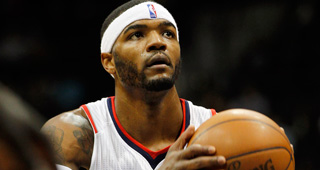Not much was expected from the Atlanta Hawks this season. The Hawks' collection of talent enjoyed a few good moments over the years, but a championship wasn’t in their future and a shift towards a rebuild project was looming.
Trading six-time All-Star Joe Johnson was a great and unexpected long-term move for the franchise. Johnson was great for the Atlanta, but Iso-Joe was owed nearly $90 million over the next four seasons and severely hurt the team’s ability to sign quality players. It was an opportunity that Hawks’ GM Danny Ferry couldn’t turn down.
Following the trade there were talks of immediately blowing up the team and going after top-tier free agents in the summer of 2013 and subsequent offseasons. The idea was met with great fanfare as Johnson’s contact had become a major issues with fans that felt the 31-year-old guard was failing to live up to his massive deal. Still, trading the team’s best player was viewed as a loss that would result in a season destined to be filled with tough nights, disappointment and turmoil, even if the move put the franchise in a better position to compete long-term.
Situations leading into a rebuild can often cause issues with the players still on the roster after a big trade, especially a team that’s enjoyed moderate success. The uncertainty surrounding their situations will often motivate a player to abandon the team concept in favor of proving that they were just as good as the big-name player that was traded. It can also become a season-long audition for potential suitors and many familiar with Atlanta’s personnel expected Phillips Arena to be the home of a lot of me-first basketball this season.
The Hawks have been the opposite.
While there are many things guys like Josh Smith and Al Horford would like to prove personally, they’ve led a team-first approach that has positioned the Hawks near the top of the conference standings. Everything is about team this season, especially the motivation to prove they’re more than a one-man show.
“We’re playing with a chip on our shoulder because at the beginning of the season people were saying we wouldn’t even make the playoffs,” Josh Smith said. “We’re playing with a chip on our shoulder; we weren’t given a chance at all when lost Joe.
“It was definitely a big loss for us, but we have a lot of talented players on this team. We’re in this thing together. Nobody is playing selfish and we have a good cohesive unit.”
Johnson was much more than a recognizable name, as was the focal point of the Hawks’ offense. Many times ball movement was scrapped in favor of isolation plays that allowed Johnson to thrive. Those plays, however, limited the opportunities for other guys to get into a groove, forcing them to wait –and-see mode as Iso-Joe did his thing. These days there are many more opportunities for guys to make plays, something that’s been essential to the team’s early success.
“I think there are more opportunities for everyone else,” Al Horford said. “We have scorers like Lou Williams and Jeff Teague that can come in and get hot on any given night, but there are more opportunities to score and we’re taking advantage of it.”
The on-court product has also been helped by off-court growth. This season the Hawks have made it a priority to learn more about each other personally. Those relationships have motivated guys to invest in their teammates professionally in hopes of playing better basketball.
“I think we’re very unselfish and it speaks to things that we do off the court together,” Smith said. “We do a lot of off the court things together and taking that time to hang out and get to know each other makes you more willing to help a guy on the court. You want to get to know guys personally and start to look at guys as more than just you teammates.”
So far the formula is working for the Hawks. They’re playing well and enjoying playing with each other. It tough to know how the business of basketball will change things in Atlanta, but until otherwise notified this is their team and they intend on playing well and proving doubters wrong.
 RealGM Analysis
RealGM Analysis
Hawks Find Short-Term Success After Making Moves For Long-Term



